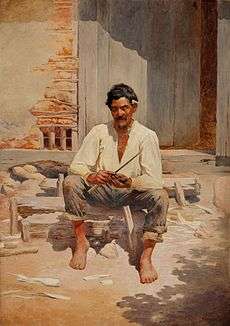Caipira
Caipira (Portuguese pronunciation: [kajˈpiɾɐ] (![]()

By extension, the term caipira can also be applied to the different cultural manifestations of the caipiras, such as their folk music. It is also the name of a group of dialects of Portuguese spoken in the interior part of the State of São Paulo and adjacent areas of neighbouring states.
The term can be considered pejorative when used to describe others (akin to "yokel", "hillbilly" and "country bumpkin"), with synonyms like matuto and jeca, but it can also be used as a self-identifier without negative connotations (akin to "melungeon"). In the traditional festas juninas people who are not otherwise considered as such dress up as stereotypical caipiras.
The diminutive form of the word, caipirinha, is the name of a cocktail considered Brazil's national drink.[1]
See also
- Caipira dialect
- Caipira music
- Caipira guitar
- Caboclos
- Gauchos
- Ribeirinhos
- Caiçaras
References
- "Casa e Jardim - NOTÍCIAS - A história da caipirinha" (in Portuguese). Archived from the original on 2011-11-17. Retrieved 2012-12-02.
Até que um dia alguém resolveu tirar o alho e o mel. Depois, acrescentaram umas colheres de açúcar para reduzir a acidez do limão. O gelo veio em seguida, para espantar o calor
- Cândido, Antônio. Os parceiros do Rio Bonito Sp, José Olympio, 1957.
- Monteiro Lobato, José Bento de. Urupês, Editora Monteiro Lobato e Cia., 1923.
- Nepomuceno, Rosa., Música Caipira, da roça ao rodeio, Editora 34, 1999.
- Queiróz,Renato da Silva. Caipiras Negros no Vale do Ribeira, Editora da USP, 1983
- Pires, Cornélio . Conversas ao pé do fogo – IMESP, edição fac-similar, 1984.